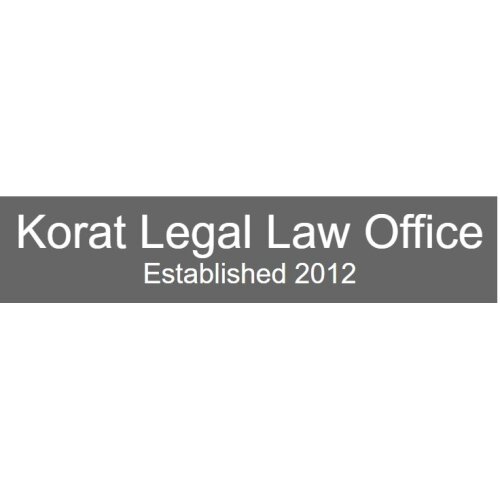Best Oil, Gas & Energy Lawyers in Nakhon Ratchasima
Share your needs with us, get contacted by law firms.
Free. Takes 2 min.
List of the best lawyers in Nakhon Ratchasima, Thailand
About Oil, Gas & Energy Law in Nakhon Ratchasima, Thailand
Nakhon Ratchasima, also known as Korat, is a significant province in Thailand, part of the Northeastern Region. While traditionally known for agriculture, the region is increasingly exploring energy projects that involve oil, gas, and renewable energy due to Thailand's national energy strategy that emphasizes diversification and sustainability. The legal landscape concerning these industries is crucial for ensuring the equitable and legal extraction, production, and distribution of energy resources. In Nakhon Ratchasima, these laws impact how energy projects are licensed, developed, and managed, ensuring minimal environmental impact and compliance with safety standards.
Why You May Need a Lawyer
There are several situations in which you might require the assistance of a lawyer specializing in Oil, Gas & Energy law in Nakhon Ratchasima:
- Regulatory Compliance: Ensuring that your energy project adheres to the numerous regulations set by both local and national bodies can be complex.
- Environmental Concerns: Energy projects often require assessments and legal assistance to navigate environmental laws and permit processes.
- Contract Negotiations: When entering into agreements with suppliers, contractors, or government entities, legal support is crucial to protect your interests.
- Dispute Resolution: Disagreements may arise over land use, contract terms, or environmental impact, requiring legal intervention.
- License and Permits: Acquiring the necessary licenses and permits involves understanding intricate legal processes.
Local Laws Overview
The legal framework governing oil, gas, and energy sectors in Nakhon Ratchasima is shaped by broader Thai national law, with specific local adaptations:
- Energy Act: This governs all aspects of energy operations, from generation to distribution, and involves meticulous compliance with regulatory standards.
- Environmental Protection Laws: These regulate the impact of energy projects on the environment, necessitating comprehensive Environmental Impact Assessments (EIAs).
- Land Use Regulations: Issues regarding land acquisition and zoning are particularly pertinent for energy projects and require careful legal navigation.
- Renewable Energy Policies: Local incentives and regulations are in place to promote cleaner energy solutions, in line with national goals.
Frequently Asked Questions
What type of permits do I need to start an energy project in Nakhon Ratchasima?
You will need to secure several permits, including those related to land use, environmental impact assessments, and specific operational licenses. Consulting a local legal expert can streamline this process.
Are there incentives for renewable energy projects in the area?
Yes, Thailand, including Nakhon Ratchasima, offers various incentives to encourage renewable energy projects, such as tax benefits and subsidies.
How can I ensure compliance with environmental laws?
Conduct thorough Environmental Impact Assessments and work closely with legal professionals who specialize in environmental law to ensure all regulations are met.
What are the common disputes in the oil and gas sector here?
Common disputes involve land rights, contract terms, and environmental concerns. Having a lawyer can help in resolving these efficiently.
Can foreign companies invest in Nakhon Ratchasima’s energy sector?
Yes, but they must comply with Thailand’s Foreign Business Act and other local regulations. Legal assistance is crucial in navigating these laws.
What should I look for when hiring a lawyer in this field?
Look for a lawyer with specific experience in Oil, Gas & Energy law, familiarity with local regulations, and a track record of effectively handling similar cases.
How do oil and gas activities affect local communities?
While they can bring economic benefits, they may also pose environmental risks and land acquisition issues, necessitating proper management and legal oversight.
What role does the government play in the energy sector?
The government sets regulatory frameworks, offers incentives, and enforces compliance through various agencies.
How can I appeal a government decision regarding my energy project?
Engage legal counsel to help you navigate the appeals process, which involves comprehensive documentation and a thorough understanding of administrative law.
Is there a push towards sustainable energy solutions in Nakhon Ratchasima?
Yes, there is a growing emphasis on sustainability, with local and national policies encouraging the development of renewable energy projects.
Additional Resources
For those needing more information or legal assistance, consider reaching out to the following:
- Department of Mineral Fuels: Offers guidance and resources for those involved in the oil and gas sectors.
- Office of Natural Resources and Environmental Policy and Planning (ONEP): Provides information on environmental regulations and impact assessments.
- The Nakhon Ratchasima Chamber of Commerce: Can offer networking opportunities and insights into local business regulations and opportunities.
- Local Environmental Groups: These can provide insights into community concerns and best practices for minimizing environmental impact.
Next Steps
If you require legal assistance in the Oil, Gas & Energy sector in Nakhon Ratchasima, consider taking the following steps:
- Identify Your Needs: Determine what specific legal services you require, whether it’s compliance, contract negotiation, or dispute resolution.
- Research and Contact Experts: Look for local legal experts with a strong background in energy law and set up consultations to find the right fit for your needs.
- Prepare Documentation: Gather all necessary documents related to your project, including permits, contracts, and correspondence with regulatory bodies.
- Engage a Lawyer Early: It’s beneficial to involve a lawyer early in your project's planning stages to ensure full compliance and mitigate potential issues.
Lawzana helps you find the best lawyers and law firms in Nakhon Ratchasima through a curated and pre-screened list of qualified legal professionals. Our platform offers rankings and detailed profiles of attorneys and law firms, allowing you to compare based on practice areas, including Oil, Gas & Energy, experience, and client feedback.
Each profile includes a description of the firm's areas of practice, client reviews, team members and partners, year of establishment, spoken languages, office locations, contact information, social media presence, and any published articles or resources. Most firms on our platform speak English and are experienced in both local and international legal matters.
Get a quote from top-rated law firms in Nakhon Ratchasima, Thailand — quickly, securely, and without unnecessary hassle.
Disclaimer:
The information provided on this page is for general informational purposes only and does not constitute legal advice. While we strive to ensure the accuracy and relevance of the content, legal information may change over time, and interpretations of the law can vary. You should always consult with a qualified legal professional for advice specific to your situation.
We disclaim all liability for actions taken or not taken based on the content of this page. If you believe any information is incorrect or outdated, please contact us, and we will review and update it where appropriate.









